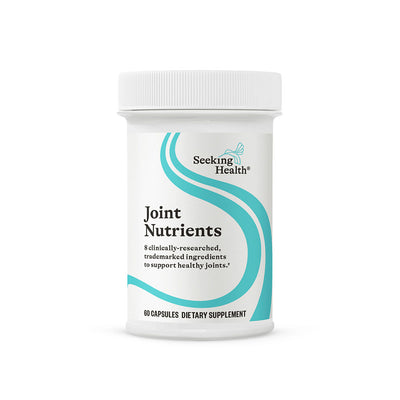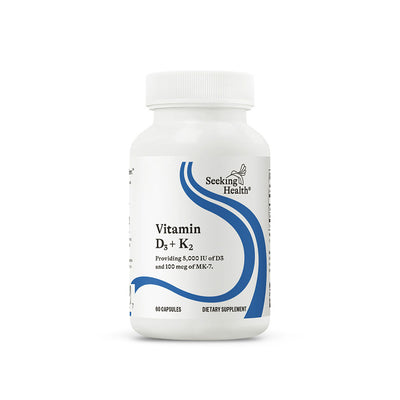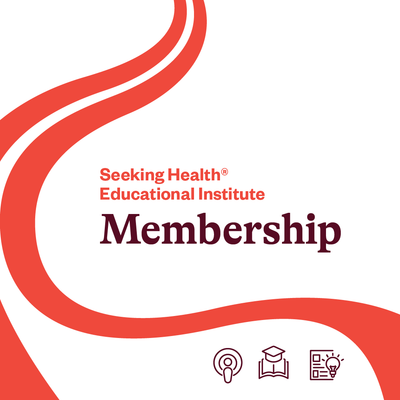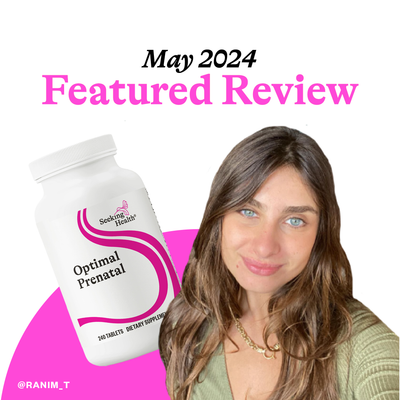Many people want to know the exact fertility diet they should follow to maximize their chances of getting pregnant.
The problem is that there is no single fertility diet! That’s right; there is no magical formula that will guarantee a pregnancy or prevent miscarriage.
There are, however, evidence-based dietary principles that can support your good health. When a mother’s body is as healthy as possible, inflammatory conditions are managed, and gut health is optimal, then it is less likely that diet will play a problematic role in the ability to conceive.
Here’s what you need to know about eating for fertility and preconception health.
Dirty Genes & Fertility
Here’s a little secret: There is no actual “fertility” diet. Now, before you feel cheated, the truth is that the diet that optimizes your fertility may actually be different from the diet that supports someone else’s. Of course, there are overarching principles, but the bottom line is that the same diet that supports your overall good health—the one that cleans your genes—is the same diet that will put your body in the best place to conceive and carry a healthy pregnancy.
The Clean Genes Protocol that is outlined in the book Dirty Genes is a good foundational fertility diet for anyone because it takes your individual factors into account.
The basics of the Dirty Genes Protocol include:
- Eat the right amount of protein
- Consume healthy fat (the right type and enough)
- Get essential nutrients from foods, like B vitamins, zinc, copper, selenium, vitamin C, and so on
- Avoid excess carbs and sugar
- Minimize toxic exposures from foods
- Avoid foods that trigger symptoms for you
- Minimize high-histamine foods, if you’re sensitive (this includes wine/alcohol, cheese, smoked or preserved foods, and others)
- Minimize alcohol intake, in general
This general protocol should be done for both partners since fertility is equally essential for both the male and female. Male factors can cause as much as 50 percent of infertility cases and can also contribute to miscarriage. Thus, focusing on a female-only fertility diet will only get you halfway there.
Now, let’s dig into each of these categories with more details and examine the research.

The Fertility Diet Starts with Whole Foods
Research does not nail down a single type of diet with confidence as to what will universally improve fertility. Why? Because no study sample size could ever be large enough. Humans are genetically unique. However, while the foods may differ, the principles behind the foods are consistent.
Whole foods are those that exist as nature made them. They’ve not been processed, refined, bleached, or “improved.” Diets that tend to promote these concepts, in general, are associated with positive outcomes in fertility research.
The Mediterranean diet has been associated with improved female fertility in some research, which often involves olive oil, lentils, legumes, whole grains, low-fat dairy products, seafood rich in omega-3 fatty acids, nuts, seeds, and more. (1) A Mediterranean diet supports healthy inflammation levels in the body, unless you’re sensitive to foods typically consumed on it, or if you need lower carbs.
In contrast, women whose fertility may be affected by weight, metabolic syndrome, or polycystic ovary syndrome (PCOS) may find that the diet that optimizes their fertility is lower in carbs and higher in protein and healthy fats. (2) PCOS is one of the top factors that can increase the risk of ovulatory infertility.
Women whose fertility may be affected by weight, metabolic syndrome, or PCOS may find that a diet lower in carbs and higher in protein and healthy fats optimizes their fertility.
What about men? Antioxidants are far more important for sperm health and male fertility than they are for female fertility. A fertility diet for men should be rich in dietary sources of antioxidants, like cruciferous vegetables, orange/yellow vegetables and fruits that contain beta carotene, vitamin-C-rich foods, and omega-3 fatty acids. (3)
The bottom line is that processing foods strips them of vital nutrients, and to support fertility and overall good health, you need a diet that contains a lot of nutrients. You won’t get that, in general, by eating a lot of refined and processed foods (especially if those foods contain the artificial form of folate, folic acid.)
Click here to learn about the problems with Folic Acid
Inflammatory Foods to Avoid
Foods that may increase your inflammation levels are also not fertility-friendly. However, what is defined as “inflammatory” can vary depending on what research you’re looking at.
Inflammatory foods can certainly include processed and refined foods, but they can also include foods that are not inflammatory for others, depending on your sensitivity level. This is because food allergies or intolerances can create inflammation in your body that may not trigger someone else.
Trans Fats
Trans fats are some of the most common inflammatory compounds found in processed foods. They’re not good for anyone, and should be avoided whether or not you’re trying to get pregnant. They can be found in fried foods, frozen pizzas, and margarine, among others. You can always check food labels to see if there are trans fats in them. Keep in mind that trans fats are different from saturated fats. Saturated fats alone are not a problem and can be found in fertility-supportive foods. Red meat, for example, contains saturated fats, and when paired with a diet rich in other whole plant foods, can be part of a fertility-friendly diet.
Histamine
Foods high in histamine can also cause inflammation. (4) High histamine foods can include:
- Alcohol
- Cheese
- Dried fruits
- Processed meats
- Shellfish
- And more
Other foods, while not high in histamine themselves, can trigger the release of histamine from mast cells. These histamine-releasing foods can still flood your system with histamine, especially if you have problems with your DAO gene and DAO enzyme. Histamine releasers can include:
- Bananas
- Tomatoes
- Chocolate
- Beans
- Citrus fruits
- Nuts
- Food additives
- Many forms of tea (black, mate, green) can also interfere with your DAO enzyme’s activity.
Few people need to eliminate all histamine from their diet, but if your food intake consists of many histamine-rich foods or histamine releasers, it could be playing a role in trouble conceiving. The solution for histamine-related problems is to lower carbohydrates, eat a diet rich in healthy proteins and fat, and support normal levels of the DAO enzyme, potentially through supplementation when needed. (5)
Click here to learn about supplements for Histamine Intolerance†
Dairy & Soy
Dairy and soy products have long been controversial when it comes to fertility: are they inflammatory, or are they fertility-friendly? The answer depends on personal sensitivity.
People who are lactose intolerant or who experience poor reactions to dairy products should not assume that they are fertility-friendly. In this case, listen to your body. If you eat dairy foods, full-fat dairy products or high-fat dairy might have more beneficial effects on supporting hormone balance.
Soy foods have been noted as both a point of concern for estrogen balance as well as a potential fertility supporter for the same reason. So who’s right? (6, 7) Ultimately, it comes down to how soy affects you. Still, outside of fertility, it is one of the top eight allergens and contains phytates that may inhibit certain digestive processes, like mineral absorption.
Inflammatory diets can also contribute to problems during pregnancy and may even increase risks for preterm birth. The mother’s diet during pregnancy can also influence the baby’s methylation status at birth—and since methylation regulates the expression of many genes, this association is significant. (8)
Fertility Protein Needs
Protein breaks down into amino acids—the literal building blocks of life. In order to copy genetic code, your body’s DNA and RNA build proteins with amino acids. For an egg to mature and be the best possible quality, the right amount of protein is required, although there is a range.
Research from Fertility and Sterility notes that protein, particularly from animal sources, is needed to promote healthy ovulation and hormone levels. This is especially true when it comes to PCOS and ensuring balanced testosterone levels in women. (9)
How much protein do you need? The answer can vary depending on your sex, activity level, and stage of life. The range for protein is between 0.8 and 1.8 grams per kilogram of body weight. That is a big range. If you’re active you’ll need more.
Since pregnancy is the process of literally building a person from scratch—and proteins are the building blocks of life—it increases protein needs for women.
Optimal protein intakes for early pregnancy are a minimum of 1.66 grams per kilogram of body weight in early pregnancy and 1.77 grams per kilogram of body weight in late pregnancy. (10)
Most people in the U.S. eat enough protein, but it’s worth calculating your daily needs versus what you’re actually eating to determine if you’re getting enough. Food tracking apps like My Fitness Pal can help to make this calculation easier.
Specific Fertility Nutrients
When it comes to specific nutrients, this is where fertility diets on the internet can lead you to believe that there may be some magic bullets out there. While some nutrients do play an essential role in supporting a healthy pregnancy, it is not true that any one single nutrient will do the trick. You need nutrients together in the context of a whole foods diet to meet your body’s overall needs. Fertility is tied to your glucose metabolism, hormone balance, gut health, heart health, and more.
Nutrients that have been associated with specific outcomes in fertility tend to be associated with reducing the risk of a poor outcome or shortening the time to pregnancy in the context of IVF or other advanced reproductive technologies (ART).
Nutrients that have been proven essential for fertility in women, men, or both include:†
- Folate: This nutrient is essential in the weeks leading up to conception and the immediate days and weeks after to prevent neural tube defects. While folic acid is typically championed, as much as 60 percent of the population may have methylation problems that suppress the conversion of synthetic folic acid to active methylfolate. Choose foods that naturally contain folate, like leafy greens. Avoid those that are fortified with folic acid. (11)
- Omega-3 fatty acids: These anti-inflammatory compounds support numerous aspects of hormonal wellness and improve how glucose and insulin work in the body, providing a foundation for fertility. They are also important for sperm health and for supporting male fertility. (12)
- Zinc: This mineral is especially important for healthy sperm and supports the increased incidence of live births when it comes to male factor infertility. (13) Zinc is needed by women, too, especially for supporting healthy thyroid function, which is necessary even for women who don’t have thyroid problems. (14)
- Selenium: An antioxidant mineral essential for healthy thyroid function, low selenium levels are associated with a longer time to pregnancy. (15)
Foods to avoid
It’s easy to want a simple list of what not to eat when you’re trying to conceive. Other than consuming refined and processed foods in limitation, there are few hard and fast rules about foods that will damage your ability to conceive.
Most fertility research centers around excessive caffeine and alcohol, as well as too many calories in general. These can all harm fertility in women either by impacting the quality of eggs or by negatively influencing the ovulatory process. (16) Where excess calories can be harmful, malnutrition can also damage fertility, primarily by contributing to poorly matured eggs. (17) Weight loss can certainly help to support overall health—as obesity can lead to numerous poor health outcomes, not just fertility struggles—but losing weight at any cost, like with extreme calorie restriction, is not going to optimize chances of conceiving. Healthy eating patterns are vital, which includes eating enough, not just avoiding too much food.
Caffeine, alcohol, and too many or not enough calories can all impact egg quality and fertility.
Endometriosis is another female fertility issue that can be influenced by dietary intake. It responds particularly well to diets low in saturated fat and that includes plenty of fiber, vegetables, fruits, and omega-3 fatty acids. (18)
Men, too, can be susceptible to fertility problems related to alcohol and excessive calories. (19)
It’s not about extreme avoidance, unless there is a need to do so. Rather, it’s about balancing these in the context of your larger dietary picture. Working with a nutritionist can help you better determine a specific plan to support your overall health.

The Problem with Vegetarian or Vegan Diets
Plant-based diets remain popular for many reasons, but when it comes to fertility, animal food protein sources are far superior and are considered to be optimal for supporting fertility and healthy pregnancy. (20)
The biggest concern around plant-based diets is that they do not provide complete proteins, meaning they fall short of giving your body all of the required amino acids. Additionally, B vitamins are crucial for normal methylation processes, and B12 is a particular concern for vegetarian and vegan diets. Supplements can fill in these gaps, but an optimal fertility diet is not one of avoidance or eliminating entire food groups (unless they are an allergen or cause problematic symptoms).
If you are vegetarian or vegan because of religious beliefs, be mindful of the complete amino acid profile required, which requires sourcing a wide variety of plant-based proteins in relatively high amounts to ensure proper balance.
When it comes to fertility, animal food protein sources are superior for supporting fertility and healthy pregnancy. An optimal fertility diet is not one of avoidance or eliminating entire food groups.
Fertility Supplements†
You can support fertility with supplemental nutrients, too. Prenatal vitamins should be taken by everyone who is trying to become pregnant. Folate, for example, is a supplement that every woman of reproductive age should be taking since it’s crucial for reducing the incidence of neural tube defects. But it’s also essential for men, too.
Supplements for fertility can also include omega-3 fatty acids, antioxidants, vitamin D, and more.
The Bottom Line
Hopefully, this has helped you understand that there is no one right fertility diet. There is, however, an optimal way for you and your partner to eat while trying to conceive. By discovering which foods support your overall genetic well-being and avoiding foods that cause inflammatory or other symptomatic reactions, you will put your body in a better position to support a healthy pregnancy.
References
- https://www.frontiersin.org/articles/10.3389/fendo.2019.00346/full
- https://www.hindawi.com/journals/ije/2019/4386401/
- https://journals.lww.com/epidem/Abstract/2019/05000/Intake_of_Antioxidants_in_Relation_to_Infertility.17.aspx
- https://www.ncbi.nlm.nih.gov/pmc/articles/PMC7463562/
- https://www.ncbi.nlm.nih.gov/pmc/articles/PMC6885995/
- https://www.ncbi.nlm.nih.gov/pmc/articles/PMC3139237/
- https://www.ncbi.nlm.nih.gov/pmc/articles/PMC4346414/
- https://pubmed.ncbi.nlm.nih.gov/28678596/
- https://www.fertstert.org/article/S0015-0282(15)00507-5/fulltext
- https://examine.com/guides/protein-intake/#optimal-daily-protein-intake-for-pregnant-women
- https://www.ncbi.nlm.nih.gov/pmc/articles/PMC4172634/
- https://pubmed.ncbi.nlm.nih.gov/29451828/
- https://www.ncbi.nlm.nih.gov/pmc/articles/PMC6010824/
- https://www.ncbi.nlm.nih.gov/pmc/articles/PMC6683068/
- https://www.ncbi.nlm.nih.gov/pmc/articles/PMC6683068/
- https://www.frontiersin.org/articles/10.3389/fendo.2019.00346/full
- https://www.frontiersin.org/articles/10.3389/fendo.2019.00346/full
- https://pubmed.ncbi.nlm.nih.gov/28326519/
- https://www.ncbi.nlm.nih.gov/pmc/articles/PMC5504800/
- https://www.fertstert.org/article/S0015-0282(15)00507-5/fulltext
‡ This information is for educational purposes only. No product results are implied.












